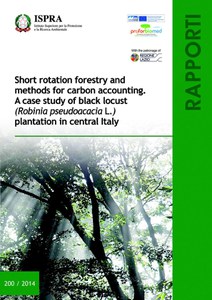Short rotation forestry and methods for carbon accounting. A case study of black locust (Robinia pseudoacacia L.) plantation in central Italy
Current global climate change is one of the main environmental concern of our time. The evidence of these incoming changes are now irrefutable and, year by year, there is a growing awareness in the scientific community, who identifies as primary cause of this phenomena, the emission of greenhouse gases (GHGs), mainly carbon dioxide, by man activity. In this context forests, if appropriately managed as in case of short rotation plantations (SRF), can represent a strategic resource both, as store of carbon in the soil and by providing energy from their biomass, offering thus a possible alternative to the use of fossil fuels, which have strong adverse impact on GHGs emissions in the atmosphere. The report stresses the environmental importance of forests and the use of bioenergy derived from the biomass for the greenhouse gases emissions abatement.
Publication available only on-line

